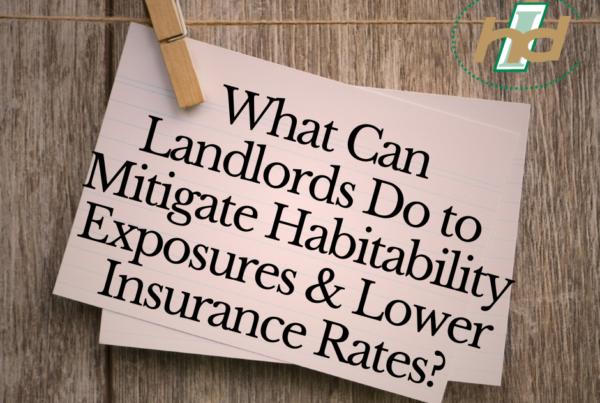
(You Don’t Know What You Don’t Know)
Over the many years we have provided insurance products to our customers, the following Insurance Sins are among the most common mistakes which we notice prospective (and sometimes current) clients commit during the insurance purchasing and review process.
These appear curiously obvious, yet we see this occurring again and again . . . and again! If you refuse to commit these “insurance sins”, your insurance experience will – I promise you – be much more rewarding.
- Undervaluing the Insurance on Your Property:
If your property is not fully insured to the contract’s requirements, the policy many penalize and restrict the amount of insurance refunds that you will receive.
Business Insurance policies, on which your apartment insurance is written, vary wildly on this point. The contracts of old had a “coinsurance clause” that was a property coverage warranty (guarantee) masquerading as an insurance premium discount. The discount was simple: If you insured at least 80%-100% of the replacement value of the property at the time of a property claim, then the company would pay 100% of the repairs less your deductible (assuming you also had a replacement cost endorsement and coverage for building code upgrades, a subject for another day).
If you did not comply with the math at the time of a loss, the policy would invoke a penalty for being “underinsured”, usually a combination of depreciating the loss (an Actual Cash Value settlement) and mathematically reducing how much the company would pay based upon how much you insured the property relative to how much you should have insurance it:
Did Insure/ = Loss Payment
Should Have Insured
Most of the insurance contracts used in today’s apartment insurance programs do not have all of these elements. Most apartment insurance policies (except for policies covering very large properties) do not show a coinsurance penalty on the policy’s declarations, providing you with a false sense of security. However, many companies do maintain the underinsurance penalty in one form or another inside their policies.
There is an easy fix: Ask your insurance agent to quote and write your insurance – or renew it – based upon the insurance company’s current replacement cost development software. You see what value you have on your insurance policy, and most people are aware enough to know if they are not adequately insured.
Part of your responsibility as an insured person is to review your policy and to determine the adequacy of the coverage. You see the coverage provided on the policy at least once each year, when you receive the renewal. If you are not sure that you are adequately insured, it is your responsibility to call your insurance agent and discuss it.
And, when you see that the new, recommended value your agent gives you is much higher than you think it should be, just accept the new insurance values. You can also request an Agreed Amount endorsement, which usually adds to the cost of the insurance.
A few extra dollars in savings is not worth the inner turmoil when you receive a claims settlement that is less than what it costs to insure the property. Yet, many insurance customers will not accept the correct limits of coverage.
- Not Telling Your Insurance Broker Everything About Your Property:
When we ask for information about a prospective customer’s property, often we are not given complete answers, such as: We don’t know how old the roof is, or, we don’t know what kind of wiring is in the property.
By not providing us the most current and up-to-date information about the property, you are not doing yourself a favor. Often, additional discounts are available or placement in more competitive markets if your agent has the most current information on a property, including past claims information.
Not providing your new and current agent with the most current information about your property may also jeopardize your insurance in that you may not have enough coverage to pay a total loss or the right kind of coverage needed to pay a claim because your needs changed . . . and you didn’t tell anyone about the changes. These changes could be increase values due to remodeling, hiring an on-site property manager (your employee or an outside management company), added a pool, etc.
- Making a Tenant Your “Property Manager.
Speaking of hiring property managers, making your longest termed tenant your unofficial property manager us fraught with problems. You may be saving a few percentage points and maintaining your current cash flow levels, but the employee – for whom you shaved a couple hundred dollars off his/her rent – who cleans up vacant apartments, shows the unit to prospective renters, and who occasionally collects rent is now an employee.
Unless you also purchased a workers’ compensation policy, when your employee is injured, you will not have coverage. If the injury is small, chances are you are in the clear; the “property manager” doesn’t want to rock the boat, either. If there is a serious injury, however, it’s guaranteed that you’ll soon be hearing from one of the attorneys de jour who advertise on billboards and on the radio. Your “property manager” reads and listens, too.
- Not Purchasing Insurance to Protect Yourself Against Employee Claims of Wrongful Termination or other forms of Harassment.
Another factor in making your tenant or anyone else your paid property manager is that you open yourself up to claims for wrongful termination, harassment, discrimination, and additional wrongful employment practices. Remember, you now have an employee and all the benefits and responsibilities that come with being an employer. And, your apartment insurance package policy most likely will not provide this coverage.
- Discriminatory Practices toward Tenants:
We covered this topic in the September 2019 issue of this magazine, so we’ll not get into it other than to say that most people don’t know how to avoid making mistakes when showing, qualifying, accepting, and keeping tenants. I suspect most of you do not know that hoarders are now a protected class. This coverage is not provided under most of your apartment insurance policies, and if they are, generally this coverage – when endorsed to an apartment package – is only for defense and will not pay any judgments.
The solution? Either buy a policy or select a property manager to take your place, and make sure they have this insurance protection on their professional policies (they probably do).
Owning property is magical and creates the most millionaires in the country. And, there are risks, of course, and responsibilities. Of the 5 we listed above, the last 3 can be largely handed off to a reputable property management company. Reputable property management companies include companies dedicated to the apartment management industry by being part of AACSC and by attaining higher education provided through AACSC’s CAM (Certified Apartment Manager) and the NARPM (National Association of Residential Property Managers) program (separately sponsored).
For the potential costs associated with the additional insurance and additional risks you are taking if you do not have the insurance coverages we discussed, you may find the cost of a property management company to be quite refreshing. Make your insurance agent and your property manager your friends, and you’ll have a much better insurance experience – guaranteed!



